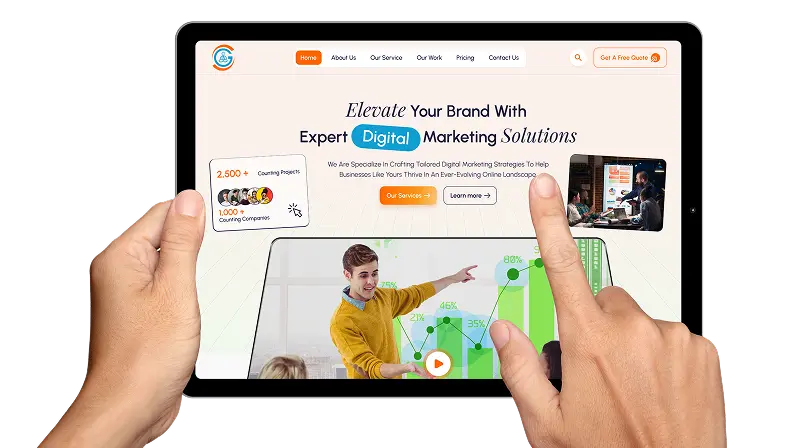Years in the business
Websites Delivered
Client Retention
Team Member
Client Review
At Websadroit, you get more than website and mobile app development services. We serve as your trustworthy partner. We provide quality work at an affordable price and, after completing the job, offer excellent support, ultimately fostering long-term relationships with our clients. We invite you to explore the testimonials from our clients and case studies, which highlight our commitment to excellence. We are proud to offer services to both the B2B and B2C sectors.
We create fast, SEO-optimized eCommerce websites utilizing Shopify, WordPress, WooCommerce, and tailored development options. If you're interested in launching your own store, we streamline the process and reduce the hassle by using cutting-edge technology to provide an outstanding experience for you and your customers.
Custom solutions utilizing Shopify, WooCommerce, and Laravel eCommerce.
Integration of secure payment gateways such as Stripe, PayPal, and Razorpay.
Designs that load quickly and are mobile-friendly to boost conversions.
User-friendly product management systems for managing updates and inventory.
SEO-optimized product listings to enhance search engine visibility.
Integration of third-party APIs for shipping, CRM, analytics, and additional services.
Real value comes from reliability, relationships and results. At Websadroit, we understand your business idea and turn it into innovative digital solutions, with a proven track record of consistently delivering work that speaks for itself and ensuring client satisfaction. Our clients appreciate not only the final product but also the experience of working with a team that listens, communicates, and genuinely cares about their success.


We offer professional web development services customized to meet your business requirements. Our aim is to provide high-quality solutions that foster growth and success.
We have assisted more than 200 businesses in reaching their objectives through our dependable web development services, showcasing our dedication to quality and effectiveness.
We take pride in achieving a 100% client retention rate—evidence that our clients frequently return for additional projects due to the quality and dependability of our services.
We provide competitive rates without sacrificing quality. Exceptional web and app development should be available to businesses of every size.
Our assistance continues beyond the launch. We offer ongoing maintenance and support to ensure your website remains highly effective as your business evolves.
We prioritize open communication with our clients. By keeping in close contact with our developers and project managers, you will experience transparency, clarity, and seamless project delivery.

At the heart of what we do is a dedication to quality and building lasting relationships. But don't just take our word for it – hear what our clients have to say. Their feedback speaks volumes about their experience with us, from smooth development to continuous support. It’s a reflection of our unwavering commitment to delivering excellence at every step.
We serve a wide range of industries by delivering tailored digital solutions designed to meet unique business goals. From eCommerce and healthcare to education, entertainment, and AI, our expertise spans across multiple sectors. Each solution is crafted with performance, scalability, and user experience in mind. Explore how we empower businesses in different industries through innovative web and mobile technologies.
Find clarity with our comprehensive FAQ section, designed to address key questions about our services, processes, and support, helping you make informed decisions with confidence.

Our website development pricing is structured to deliver high-quality, fully customized solutions tailored to your business needs:
Landing Page
$149 USD Includes a unique, professionally crafted design using WordPress.
8–10 Page Website
$450 USD Custom layout and responsive design optimized for performance.
4–5 Page CMS Website
$399 USD Designed from scratch—no pre-made templates—to ensure a distinct brand presence.Custom layout and responsive design optimized for performance.
16–18 Page Website
$699 USD Comprehensive design and development for growing businesses.
WooCommerce Website
Starting from $499 USD E-commerce solution with a custom shopping experience and secure payment integration.
Custom Website Using Next.js
Starting from $699 USD High-performance, scalable websites using modern frameworks.
All projects include a brand-new design tailored to your brand identity. For advanced or complex requirements, we offer fully custom solutions—please contact us for a personalized quote.
Developing a WordPress website involves a structured and results-driven process. At Websadroit, we follow these key steps to ensure every site we build is tailored, secure, and performance-ready:
Requirement Analysis
We begin by understanding your business goals, target audience, and design preferences through a detailed consultation.
Custom Design Creation
Our designers create a unique, brand-aligned layout—avoiding pre-made templates to ensure your website stands out.
WordPress Development
We convert the approved design into a responsive, SEO-friendly WordPress website using clean, scalable code.
Content Integration
Your content—text, images, and multimedia—is professionally added to each page with optimal formatting and styling.
Functionality Setup
We implement necessary plugins, contact forms, security layers, speed optimizations, and any required custom features.
Testing and Quality Assurance
The website is tested across multiple devices and browsers to ensure flawless performance and user experience.
Launch and Support
Once approved, we deploy the website on your preferred hosting. We also provide training, ongoing support, and maintenance options.
This process helps us deliver websites that are modern, secure, and ready to grow with your business.
Yes, we offer fully custom website development tailored to your unique business requirements.
Custom Web Applications
Tailored solutions for specific business needs.
E-commerce Solutions
Custom online stores with unique features.
API Integrations
Connecting your website with third-party services.
Content Management Systems
Custom CMS solutions for easy content management.
Our custom development services ensure that your website is built to meet your specific needs.
At Websadroit, we typically use React Native or Flutter to develop cross-platform mobile applications, allowing a single codebase to power both Android and iOS. This approach significantly reduces development time and cost, making it an efficient and budget-friendly solution for our clients.
For a standard mobile app with 10–12 screens, including brand- new custom screen designs, our pricing starts at $699 USD.
We also specialize in building complex mobile applications with advanced features, integrations, and scalable architecture.For detailed pricing on larger or more customized projects, we recommend contacting our team directly.
Hiring skilled mobile app developers requires a thoughtful and structured approach to ensure the right fit for your project. At Websadroit, we follow a transparent process to make it easy for you:
Define Your Project Scope
Start by outlining your goals, required features, timeline, and preferred platforms (iOS, Android, or both).
Schedule a Consultation
Meet directly with our developers or project manager to discuss your requirements, technical needs, and budget.
Review Portfolio & Capabilities
Explore our past work and technical proficiency in React Native, Flutter, and other technologies to ensure alignment.
Assign a Demo Task
We offer a small demo task to help evaluate our developer’s capabilities and working style before a full commitment.
Choose Your Engagement Model
Decide whether you want to proceed on an hourly, fixed-cost, or dedicated developer basis with clear deliverables.
Start with a Trial Phase
Begin with a smaller module or task to build confidence and ensure mutual compatibility.
Maintain Ongoing Collaboration
Stay updated through regular communication via Zoom, Slack, or your preferred tools for smooth development and feedback cycles.
Hire a Mobile App Developer – Work with our experienced team to bring your app to life.
Hybrid mobile app development is a cost-effective approach that combines the best of both native and web technologies. A hybrid app is built using web technologies like HTML, CSS, and JavaScript, then wrapped in a native container, allowing it to run seamlessly on both iOS and Android devices from a single codebase.
Websadroit, we specialize in developing high- performance hybrid apps using modern frameworks like React Native and Flutter.This approach not only reduces development time and cost but also ensures consistent user experience across platforms.
Hybrid apps are ideal for businesses looking to:
Custom Web Applications
Tailored solutions for specific business needs.
E-commerce Solutions
Custom online stores with unique features.
API Integrations
Connecting your website with third-party services.
Content Management Systems
Custom CMS solutions for easy content management.
We can help you optimize your website for better performance and user experience.
At Websadroit, our eCommerce website development process is strategically designed to ensure performance, scalability, and business growth. We typically use WordPress with WooCommerce for small to mid-size stores due to its flexibility and cost-effectiveness. For more advanced or feature-rich online stores, we recommend Shopify for its scalability and ease of management. For businesses with highly specific requirements, we also offer custom Laravel-based development.
Here’s a brief overview of the process:
Requirement Understanding
We begin by analyzing your business goals, product types, and target audience. This helps us define the scope, functionality, and user experience your platform should deliver.
Technology Selection
Based on your business size and complexity, we help you choose the right platform:
WooCommerce: Ideal for startups and SMEs needing a custom yet affordable solution.
Shopify: Best for businesses seeking ease of use with advanced features and scalability.
Laravel(Custom): Recommended for unique workflows or integrations requiring tailored architecture.
Custom Design & Development
We create a unique design aligned with your brand. No pre-made templates—each design is tailored for your users. Our team develops intuitive interfaces, shopping cart features, product filters, and more, ensuring a smooth user journey.
On-Page SEO Optimization
Basic SEO best practices are implemented during development:
Clean URL structures
Optimized meta tags
Fast- loading pages
Mobile responsiveness This ensures your store is discoverable from day one
Payment & Shipping Integration
We integrate secure payment gateways like Stripe, PayPal, and others, as well as shipping options based on your logistics preferences.
Testing & Launch
We thoroughly test the website across devices and browsers before deployment. After client approval, we move the site live with all configurations in place.
Post-Launch Support
Our job doesn’t end at launch. We offer ongoing support, updates, performance monitoring, and training so your team can manage the store confidently.
Looking to build or upgrade your eCommerce platform? Get in touch with us for a free consultation.
Hiring a skilled app or web developer depends on the scope, complexity, and duration of your project. At Websadroit, we offer flexible hiring models tailored to your specific needs—whether you require part-time, full-time, or project-based support.
We specialize in creating scalable, high- performance web and mobile solutions using technologies like React Native, Flutter, Laravel, WordPress, Shopify, and more.Our transparent pricing ensures you get expert service without hidden costs.From simple mobile apps to complex custom web platforms, we provide cost - effective solutions that drive results.
Hire a Dedicated Developer to bring your website or mobile app idea to life with confidence, innovation, and expert guidance.
We take pride in delivering impactful digital solutions. Our case studies highlight successful projects, from eCommerce platforms to custom web applications, showing how we help businesses solve problems, scale, and succeed.